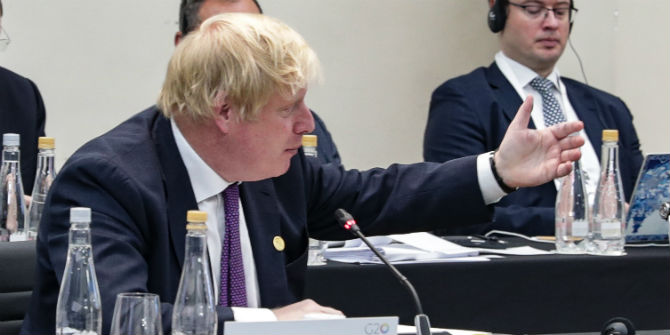 For Boris Johnson, writes Dmitri Zenghelis (LSE), survival trumps principle every time. That means he has nothing to gain from a no-deal outcome. If he becomes PM, he may even make it clear that the price of another defeat for May’s deal in Parliament would be a second referendum – something Brexiteers will not want to risk.
For Boris Johnson, writes Dmitri Zenghelis (LSE), survival trumps principle every time. That means he has nothing to gain from a no-deal outcome. If he becomes PM, he may even make it clear that the price of another defeat for May’s deal in Parliament would be a second referendum – something Brexiteers will not want to risk.
Boris Johnson, Britain’s likely the next Prime Minster, is a survivor. Yet by taking the helm rather than sniping from the sidelines, he will now have to own the issue he played such a critical role in generating: Brexit. As leader, he will be forced to reconcile the numerous contradictory and irreconcilable positions that have thwarted agreement in Parliament. And that’s just within his own party. Many moderates and Remainers are gleefully relishing the thought that this key instigator of the current mess may now find himself hoisted by his own petard.

Yet fears of no deal seem overplayed. For Johnson, survival trumps principle every time. It is clear that despite having secured the party leadership by promising Conservative Party members a “do or die” Brexit on October 31, he will have nothing to gain from a no-deal outcome. If the UK crashes out of the EU, the up-front dislocation will be so socially and economically traumatic that his tenure at No. 10 is likely to prove short lived. If, on the other hand, a no deal Brexit is blocked in parliament, this will similarly raise the prospect of an early election and the potential annihilation of the Tories in parliament.
One option might be to dust down Theresa May’s agreement and present it to parliament with some cosmetic changes, say, to the non-binding political declaration. On the face of it, this strategy seems no more likely to succeed than the three times it was attempted by his predecessor. For sure, he may benefit from a brief honeymoon period garnering support of some members of his own party, but it seems unlikely that many Labour parliamentarians will want to save Boris’s bacon just when the prize of dealing a knockout blow to the Tories is so tantalisingly close. Nor does there seem much prospect of securing Eurosceptic ERG and DUP support, among members who will rightfully feel betrayed by the resuscitation of the same compromise they bitterly opposed in the past.
The unavoidable truth is that the parliamentary arithmetic is no more favourable to Johnson than it was to May. But the survivor with no guiding principles has one card up his sleeve, as the Tories reach their end-game. Once in No. 10, Johnson might quietly let it be known that unless an agreement with the EU is passed in parliament, he might seek to break the deadlock by returning the question to the people in some form of second referendum.
The prospect of a referendum would never be made public, of course. A leaked source to the Sunday papers might be more fitting. Johnson will naturally deny such journalistic speculation is utter tosh and piffle, reasserting his commitment to stay true to his promise to deliver Brexit on October 31. But the message will have got out loud and clear. Back the deal, or risk no Brexit at all. Of course May tried the same trick to no avail, but with her tenure always time limited, she consequently carried no credibility. With Johnson it is different. The next Prime Minister is more likely to come by way of a general election than another Tory leadership contest. And that Prime Minister may be called Jeremy.
The hard Brexiters are slowly waking up to the realisation that they may have overplayed their hand. If they do not ally with the new PM, they may lose Brexit altogether. What makes this more compelling is the possibility that for Johnson, such an about-turn may prove popular, marking him out as a catch-all one-nation Tory, seeking to build consensus among the people of Britain and standing at odds from the braying hoards in Westminster. Voters may flock back from both the Lib Dems and the Brexit Party camps (with many Brexit Party supporters believing that a second referendum may deliver the same result as the first, only louder). This strategy might not guarantee a general election win, but it might afford him the chance to serve out this parliamentary term as PM. That’s a chance he’d probably take.
Even the EU might help. The received wisdom is that the EU will not re-open the negotiations. Yet the change in the EU Commission may also give the negotiation process a fresh start. If the European Commission and the European Council felt that the new UK PM could deliver a deal, they might be inclined to re-open the negotiations. With Brexit less of a threat to the Union, in terms of the potential appeal to other members, the EU may bend a little to push this through and eliminate the risk of No Deal. After all, in the transition stage, the EU would hold most the cards.
With some concessions from the EU and with no prospect of replacing Mr Johnson without risking a Labour government, the Eurosceptic right may have no choice but to acquiesce. If they don’t, then the man who at the last minute decided to back Leave in the 2016 referendum might yet be the hero of Remainers and moderates by delivering their much sought-after People’s Vote.
This post represents the views of the author and not those of the Brexit blog, nor LSE.







Dimitri, Your ‘the up-front dislocation will be so socially and economically traumatic’. Why would you expect such major dislocation, and in what areas in particular, and in those areas what exactly do you think would be the cause of the dislocation?
My particular interest is in NTBs for (non-food) products (see web-site). I am shocked by HMG’s 10% No Deal estimate, and the apparent absence of any attempt to calculate actual costs bottom up, so to say – resorting rather to far-fetched comparisons with EU-US trade, the break-up of the Soviet bloc, and decolonisation (!). (https://assets.publishing.service.gov.uk/government/uploads/system/uploads/attachment_data/file/759763/28_November_EU_Exit_Long-Term_Economic_Analysis_Technical_Reference_Paper.PDF)
Where do you see the costs arising from? Regulatory checks at the border? Transferring certificates to EU27 bodies (largely done now, so a sunk cost, and rather modest at that)? Customs declaration administrative costs? Or where?
Thanks, Andrew
You are right.. Johnson is a survivor…. on his terms and his terms may well flout most preconceptions of what , in his case, surviving means.- because he is a sycophant unto himself. When challenged or questioned on any sort of intellectual; basis he reverts to buffoonery and rather meaningless self designed rhetoric
#
You and I might agree that a no deal exit is not in his best interest. – Is it in anyone’s best interest? I doubt that balancing act has even occurred to him. Thinking of the manner in which British politics can be conducted in the Commons I would say he is something of a dangerous man to have around as I doubt he cares.
I doubt any Johnson influence carrying sway with Brexiters based on thinking they might win in a 2nd referendum with no deal as the option to Remain. Just look at the leave vote against the Remain vote in the E U elections. 2 to 1 against. Remain supporting Conservatives would go to LIb Dem Brexit would still take votes from both Tories and Labour. a coalition G E result twixt lab and Lib Dem would keep us in the E U